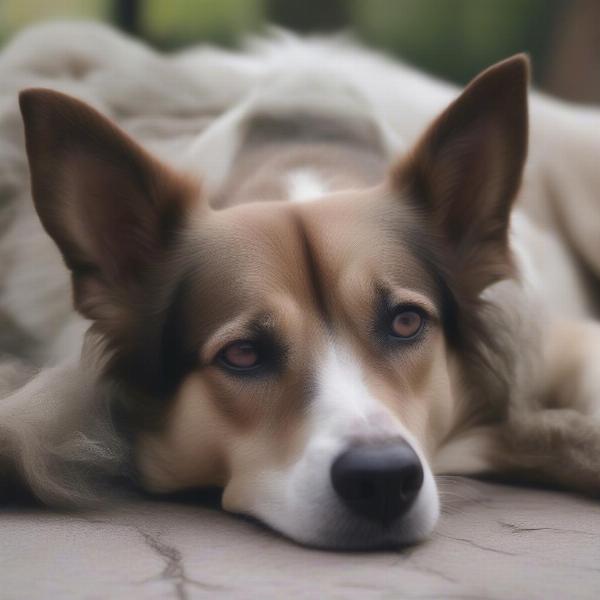Champagne and celebrations often go hand-in-hand, but when it comes to our canine companions, this bubbly beverage is definitely off-limits. While the thought of your dog enjoying a New Year’s toast with you might seem amusing, the reality is that alcohol, even in small amounts, can be toxic to dogs. This article will delve into why champagne is harmful to dogs, the potential risks involved, and what to do if your dog accidentally ingests some.
Why is Champagne Harmful to Dogs?
Dogs metabolize alcohol much differently than humans do. Their smaller size and different metabolic pathways make them more susceptible to the toxic effects of alcohol. Even a small sip of champagne can lead to alcohol poisoning in dogs. The ethanol in champagne is rapidly absorbed into a dog’s bloodstream, affecting their central nervous system. This can result in a range of symptoms, from mild incoordination to severe respiratory depression.
Potential Risks of Champagne Consumption in Dogs
The severity of the symptoms depends on several factors, including the size of the dog, the amount of champagne consumed, and the dog’s individual sensitivity. Some common signs of alcohol poisoning in dogs include:
- Vomiting
- Diarrhea
- Weakness
- Incoordination
- Disorientation
- Tremors
- Seizures
- Difficulty breathing
- Coma
In severe cases, alcohol poisoning can lead to death.  Dog exhibiting symptoms of alcohol poisoning
Dog exhibiting symptoms of alcohol poisoning
What to Do if Your Dog Drinks Champagne
If your dog ingests champagne, it’s crucial to act quickly. Contact your veterinarian immediately or an emergency animal hospital. Time is of the essence in these situations. Provide your veterinarian with as much information as possible, including the type of alcoholic beverage, the estimated amount consumed, and your dog’s size and breed. Do not induce vomiting unless instructed to do so by your veterinarian, as this can sometimes worsen the situation.
Preventing Champagne-Related Accidents
The best way to protect your dog from the dangers of champagne is prevention. Keep alcoholic beverages out of reach, especially during parties or celebrations. Educate guests about the risks of giving alcohol to pets. If you’re planning a toast, ensure your dog is in a separate, secure area where they cannot access unattended drinks.
Conclusion
Champagne, while celebratory for humans, poses a serious threat to dogs. Even small amounts can have detrimental effects. By understanding the risks and taking preventive measures, you can ensure your furry friend stays safe and healthy during any celebration. Never offer your dog champagne or any other alcoholic beverage. If you suspect your dog has consumed alcohol, seek immediate veterinary attention.
FAQs
- Can dogs have non-alcoholic champagne? No, even non-alcoholic champagne can contain trace amounts of alcohol that could be harmful to dogs. It’s best to avoid it altogether.
- What are the long-term effects of alcohol poisoning in dogs? Long-term effects can include liver and kidney damage, neurological problems, and behavioral changes.
- Is there a safe amount of alcohol for dogs? No, there is no safe amount of alcohol for dogs. Any amount can be potentially toxic.
- What are the signs of alcohol poisoning in a puppy? Puppies are even more susceptible to alcohol poisoning. Signs can include weakness, lethargy, vomiting, low body temperature, and difficulty breathing.
- How long does it take for a dog to recover from alcohol poisoning? Recovery time depends on the severity of the poisoning and the dog’s individual response to treatment. It can range from a few hours to several days.
- What are some dog-friendly alternatives to champagne for celebrations? Consider offering your dog a special treat, a new toy, or a dog-friendly “pup-sicle” to make them feel included in the festivities.
- Can I give my dog sparkling water instead of champagne? Plain, unflavored sparkling water in small amounts is generally safe for dogs, but avoid sparkling water with added sugars, sweeteners, or flavors.
Related Articles
- silver labs dogs
- dog with champagne
- drake for all the dogs calendar
- heywood wakefield dog bone chairs
ILM Dog is your trusted source for expert dog care advice. We offer comprehensive information on dog breeds, health, training, nutrition, grooming, and much more. From puppy care to senior dog care, we cover all aspects of dog ownership. For professional guidance on choosing the right breed, managing your dog’s health, or finding the perfect products for your furry friend, ILM Dog is here to support you. Contact us today at [email protected] or +44 20-3965-8624 for personalized advice. Visit us at ILM Dog for more information.